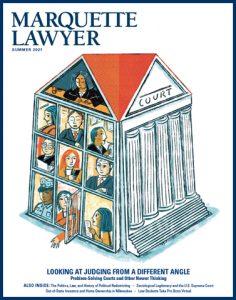 Spotlighting aspects of the life of Marquette Law School is an important goal of any issue of Marquette Lawyer magazine. Yet a successful issue does more than that. It also provides in-depth reporting and thinking about major issues that shape the law and affect lives.
Spotlighting aspects of the life of Marquette Law School is an important goal of any issue of Marquette Lawyer magazine. Yet a successful issue does more than that. It also provides in-depth reporting and thinking about major issues that shape the law and affect lives.
Measured against such important goals, the Summer 2021 issue of Marquette Lawyer is a strong success. It offers a set of stories focusing on judges, several of them alumni of the Law School, who are taking “problem-solving” approaches to their work. This moves them beyond the conventional ways of presiding over courtrooms and cases. Instead, they lead teams trying to help people achieve stable living. There is not universal agreement even among judges as to its desirability, but the cover stories identify and explore an important trend. The magazine also includes an extensive primer on political redistricting issues that are hot subjects currently. Another article examines the surge in investors from beyond Wisconsin who are buying homes in Milwaukee. And, certainly, the magazine reports on aspects of life at the Law School, including the success of students’ pro bono work during the pandemic, an unusual honor extended to two emeritae professors, career milestones of some Marquette lawyers, and a conversation on corporate law between a Marquette faculty expert and a notable Delaware judge.
Here is a guide to the content, including links that will take you to the full articles.
Can Judges Become Helpers? The role of courts is being given new dimensions by dozens of judges across Wisconsin whose work includes presiding in treatment courts that aim to reduce recidivism by helping people put issues such as addiction behind them. “We are creating a new wave of judges,” says Chief Judge Mary Triggiano of the Milwaukee County Circuit Court. “We’ve made some profound changes in the way we judge.” In five pieces, this package describes how treatment courts work and profiles some of the judges who are involved. To read the stories, click here.
Big Need, Big Change, Big Help. Marquette Law School puts a priority on encouraging and helping students to take part in pro bono efforts. But during the COVID-19 pandemic, how were students (and volunteer lawyers) to continue in the clinics and the direct help at the center of their efforts? By switching to virtual work, of course, including launching a help line that has received thousands of calls. Read the story by clicking here.
Still Winning in the Court of Public Opinion. The Marquette Law School Poll’s second annual nationwide survey of public opinion about the U.S. Supreme Court found that majorities are satisfied with the work of the Court. People give the Court higher marks than the presidency or Congress, and believe that it bases its decisions on the law more than politics. Might an interest in keeping that standing among public opinion affect how the Court decides upcoming cases? Read the story, reporting on both public opinion and that of experts, by clicking here.
Between the Lines: The Politics, Law, and History of Political Redistricting. As the battles in Wisconsin heat up over political redistricting following the 2020 census, the Law School’s Lubar Center for Public Policy Research and Civic Education provides a primer that describes how political boundaries are determined and the history that has brought up the current system. While state legislative districts draw the most contentious advocacy, this package of stories also describes congressional and local redistricting practices, and gives perspective on what is and is not at stake currently. To read the stories, click here.
Who Owns the House Next Door? While relatively small efforts to help low-income people buy homes in Milwaukee have had successes, the big action in purchases of inexpensive homes involves investors from beyond Wisconsin who see low home prices and substantial rental income as attractive investment opportunities. This very recent and accelerating development has substantial social implications. Read the story by clicking here.
Of LLCs, ESGs, Diversity, and Virtual Annual Meetings. Delaware Vice Chancellor J. Travis Laster talks with Nadelle Grossman, professor of law and associate dean for academic affairs, about developments in corporate law. In early 2020, Laster was Marquette Law School’s annual Hallows Judicial Fellow. Read excerpts of their conversation by clicking here.
In the Law School News section, we recognize the winners of four alumni awards: Deborah McKeithan-Gebhardt, L’87, alumna of the year; James T. Murray, Jr., L’74, for lifetime achievement; Sarah Padove, L’12, the Charles W. Mentkowski Sports Law Alumna of the Year; and Raphael R. Ramos, L’08, who received the Howard B. Eisenberg Service Award.
The Law School News section also includes a story on the unveiling of portraits in Eckstein Hall of two emeritae professors, Carolyn M. Edwards and Phoebe Weaver Williams; a report on a community conversation on policing and accountability; a set of quotations from speakers to give a flavor of recent virtual Law School programs; and a description of a new book exploring the famous Chicago lakefront’s legal history, including the American public trust doctrine, which has its origins there.
The Law School News pages may be read by clicking here.
The Class Notes section, with updates on several dozen Marquette lawyers, includes an appreciation of R. L. McNeely, L’94, who grew up in Flint, Mich., and became a professor at the University of Wisconsin-Milwaukee, community leader, and lawyer. Class Notes may be read by clicking here.
A message from Dean Joseph D. Kearney, introducing the magazine and reflecting in particular on the cover stories, may be read by clicking here.
The full issue of the magazine may be read by clicking here.
